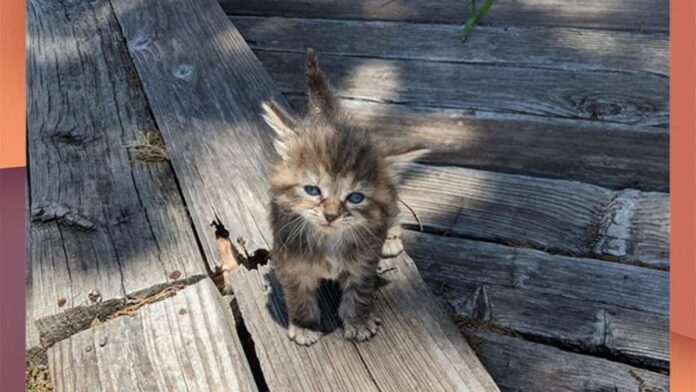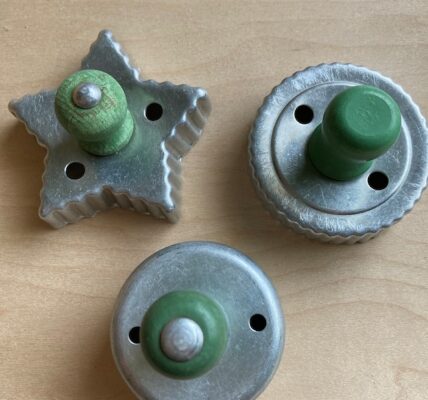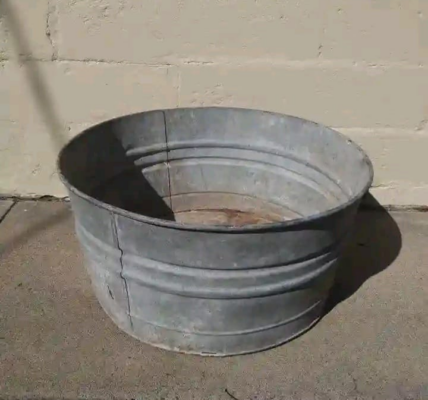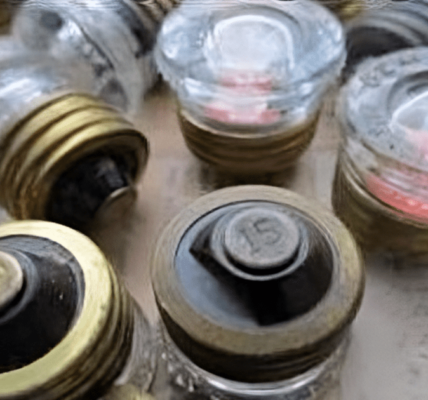Optical illusions have a unique way of capturing our attention, sparking curiosity, and challenging our minds. The image here is no exception—it presents what seems like a simple photo of a cute kitten standing on a wooden floor. But don’t let this initial appearance fool you; a second cat is cleverly concealed within this scene. So, the question is: where exactly is this hidden cat?
Common Missteps: Why This Puzzle Tricks Most People
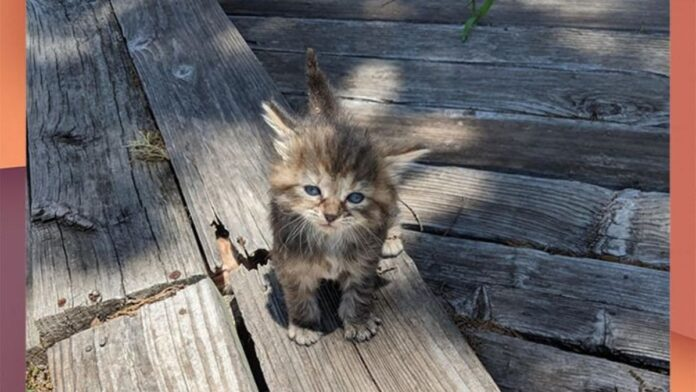
One of the main reasons people struggle with this puzzle is because of how our brains process familiar objects. When we spot the obvious kitten in the center, we tend to think the puzzle is solved, assuming there’s nothing more to find. This cognitive bias leads us to overlook subtle details that might otherwise reveal the answer.
Another reason is that our brains tend to filter out unnecessary information when it comes to familiar images. In this puzzle, most viewers are conditioned to stop searching after seeing the visible kitten, never considering that something else might be camouflaged in plain sight.
Understanding the Brain’s Shortcuts: Why We Miss Small Details
Our brains are wired for efficiency. We focus on prominent details and often ignore smaller, seemingly insignificant elements. When presented with an image like this, we zero in on the most obvious feature—in this case, the cute kitten in the center—while skipping over subtler aspects like floor textures or cracks in the wood. Ironically, it’s precisely these “insignificant” details that hold the key to this puzzle.
To avoid overlooking these subtle clues, it’s essential to train your mind to examine each section of an image carefully, even if it initially appears trivial. With patience and focus, you can uncover hidden surprises in visual puzzles.
Step-by-Step Guide to Finding the Hidden Cat
If you’re ready to solve this mystery, follow these steps closely to reveal the hidden cat lurking in this image.
Step 1: Focus on the Visible Kitten
The first thing that catches your eye is likely the visible kitten standing in the center. Its adorable face and tiny paws are hard to ignore. But remember, the puzzle is about finding a “second cat.” So, while you appreciate this kitten’s charm, remind yourself to keep searching.
Step 2: Expand Your View to the Wooden Floor
Next, shift your gaze from the kitten to its surroundings, particularly the wooden floor beneath it. Pay attention to the cracks, grain, and textures of the wood. The image may look like an ordinary floor, but the answer to this puzzle lies in these very details. Could one of these cracks or shadows be hiding something?
Step 3: Inspect the Highlighted Area Carefully
In the image, you may notice an orange circle indicating a specific area on the wooden floor. This is a clue to where you should focus. Within this circle, if you look closely, you’ll spot an outline that resembles the face of a second cat. The shape of the ears and the faint outline of a nose and eyes emerge subtly from the cracks in the wood, almost blending in as if it were part of the floor itself.
Step 4: Recognizing the Hidden Cat in the Floor Pattern
Once you’ve identified the outline, you’ll see that the “second cat” has been cleverly hidden by using the natural shapes and textures of the wooden floor. This illusion plays on the brain’s tendency to ignore mundane details, making it a challenging yet satisfying discovery once you see it.
The Reveal: The Second Cat Hiding in Plain Sight
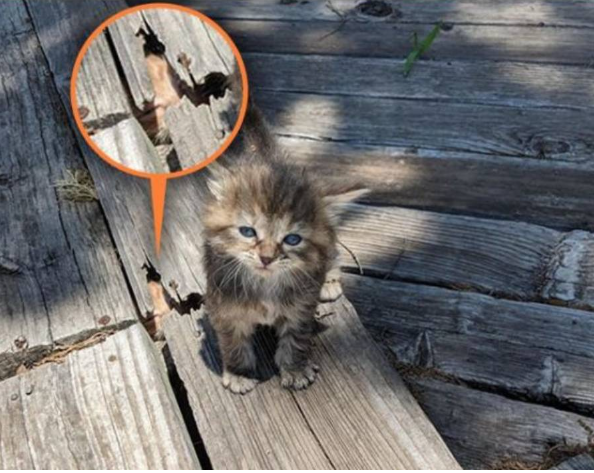
The second cat is camouflaged right in front of us, blending seamlessly with the cracks and grain of the wooden floor. Its face is subtle, but undeniably there once you know where to look. This optical illusion masterfully uses natural patterns to deceive the mind, hiding the second cat in plain sight until you take a closer, more intentional look.
The Power of Optical Illusions: What This Puzzle Teaches Us
Optical illusions like this one serve as more than just a fun mental exercise. They remind us of the value of slowing down, looking beyond the obvious, and challenging our initial perceptions. Here are a few lessons we can take from solving this puzzle:
- Stay Calm and Observe Carefully: In high-pressure situations, it’s easy to make snap judgments. Taking a moment to breathe and observe can reveal hidden details that were initially missed.
- Challenge Your Assumptions: Just because you see a kitten doesn’t mean that’s the only cat in the image. Always ask yourself if there’s more to the picture than meets the eye.
- Focus on the Unexpected: Small, overlooked areas often hold the key to puzzles like these. Instead of focusing only on prominent features, pay attention to the seemingly unimportant parts of the image.
Why This Puzzle Works as a Mental Exercise
This brain teaser isn’t just a playful challenge; it’s also an effective tool for enhancing your problem-solving skills. Life often presents situations where we feel “stuck” or overlook the solutions hidden in plain sight. In these moments, the lessons from this riddle—staying calm, being thorough, and questioning assumptions—can be applied to real-world problem-solving.
- Encourages Creative Thinking: With limited options in the puzzle, you’re forced to think creatively to find an answer.
- Promotes Mindfulness: Finding the second cat requires mindfulness and careful examination of each detail.
- Strengthens Logical Thinking: By focusing on overlooked areas, you develop a logical approach to problem-solving.
Challenge Your Friends and Share the Fun
Now that you’ve solved the puzzle, you’ve developed a sharper eye for spotting hidden details. Did you find the second cat right away, or did it take a few tries? Share your experience in the comments, and challenge your friends to see if they can spot it too. Optical illusions like this one aren’t just enjoyable; they’re also a fantastic way to improve observation skills and develop a keener eye for detail.
Conclusion: Embrace the Art of Observation Through Puzzles
This hidden cat puzzle is a reminder of how easily we can miss small details in favor of the obvious. Solving puzzles like this is more than entertainment—it’s a workout for your brain, keeping it sharp and flexible. The next time you come across a visual puzzle, take your time, question your assumptions, and remember that sometimes the answer lies in the details.
Optical illusions and brain teasers are waiting for you to explore, offering endless opportunities to sharpen your mind. Keep challenging yourself with new puzzles and enjoy the journey of discovering what’s hidden in plain sight. Happy puzzling!
